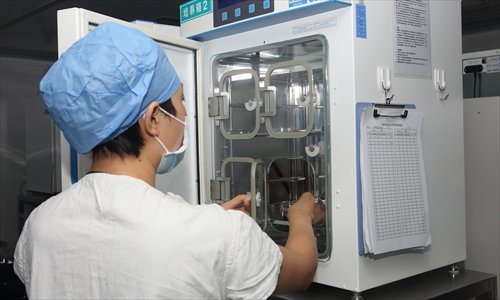HOME >> CHINA
Frozen embryos in limbo
By Li Ruohan Source:Global Times Published: 2015-10-7 20:18:01
Hospitals face dilemma over missing parents

Photo: CFP
Hospitals are facing a dilemma of whether to keep or discard frozen embryos after many parents fall out of contact and stop paying storage fees.The Jiangsu Provincial People's Hospital announced it will dispose of nearly 10,000 embryos frozen before 2005, the Beijing Times reported on September 27.
The hospital has been unable to reach more than 70 percent of the parents of the frozen embryos to inform them of the approaching disposal, said Wang Wei, director of the reproduction center of the hospital.
Many couples came to unfreeze their embryos after China relaxed its family planning policy two years ago to allow couples to have a second baby if either parent is from a single-child family, according to the Beijing Times report.
One of Shanghai's earliest in vitro fertilization institutes, Shanghai Jiai, told the Global Times in a previous report that last year alone the facility helped nearly 13,000 couples unfreeze eggs and attempt pregnancies.
Missing parents
More than 10,000 babies born on the Chinese mainland between 1988 and 2004 were born through in vitro fertilization, a process in which a woman's eggs are fertilized by sperm outside the body and the embryo is then implanted into the woman's womb, according to China's Ministry of Health.
About 70 percent of couples froze their unused embryos after the procedure, said Huang Xiaojin, director of the reproduction center of the First Affiliated Hospital of Nanchang University, according to a Jiangxi Morning News report published in March.
Hospitals will normally sign an agreement with parents on preserving the embryos unused in the process, and parents need to pay around 1,500 yuan ($235) in advance for a year's storage. Hospitals will contact the parents after one year, a doctor with West China Hospital, Sichuan University, told the Global Times, requesting anonymity.
However, hospitals find most of the parents are "missing" when they call to collect fees, doctors from several hospitals in different areas confirmed to the Global Times.
The reason that those parents are "out of contact" are varied. Some parents leave the wrong mobile phone number and address, and some just hang up the phone, unwilling to let others know that their baby was a result of in vitro fertilization, reported the news portal youth.cn.
Ethically and legally bound
According to Jiangxi Morning Post, embryos need to be stored below -196 C in tanks with liquid nitrogen, and hospitals need to rent places to keep those tanks. Each of those tanks cost around 30,000 yuan, in addition to extra money to replenish the liquid nitrogen.
"We [the hospital] will keep the embryos even if the parents are out of contact, which is very often the normal case, and the hospital now has embryos that it saved for 10 years," said the doctor at West China Hospital.
Parents give up ownership of the embryo if they do not pay the fee for three months, according to an agreement on frozen embryos available on the website of the Center for Reproductive Medicine at the Tianjin Central Hospital for Obstetrics and Gynecology.
Parents also need to select whether they prefer to donate the embryos for scientific use or allow hospitals to destroy them, according to the agreement.
"Hospitals are stuck with the dilemma of making their own call to give up the embryos when the parents are out of contact. The cost of preserving the embryos needs to be borne, especially as in vitro fertilization is accepted and adopted by increasingly more people," Li Mei, head of the laboratory of the reproductive hospital affiliated with Shandong University, told the Global Times.
Many doctors confirmed to the Global Times that the frozen embryos would not be "destroyed or abandoned" even when the hospitals cannot reach their parents, and will continue to save the embryos amid increasing costs and moral risks.
"The hospitals are not legally bound to preserve the embryos indefinitely," Tang Zeguang, a lawyer with the Beijing Jindong Law firm told the Global Times.
The hospital's obligation to preserve the embryos ends when the parents fail to fulfill their duty to pay the cost, said Tang.
However, though current Chinese law does not define embryo as life or property, it is regarded as more than just a simple article and a respect for life is needed, Liu Ye, an experienced medical lawyer, told the Global Times in a previous report.
Posted in: Society